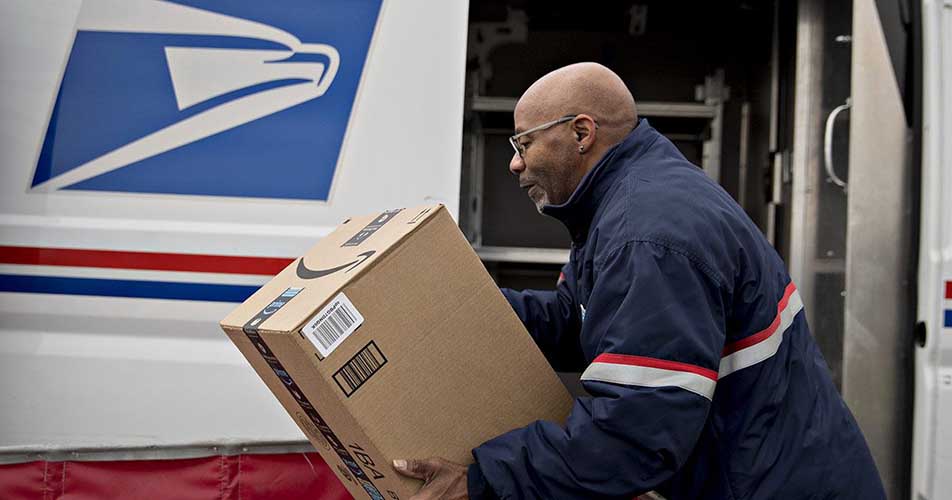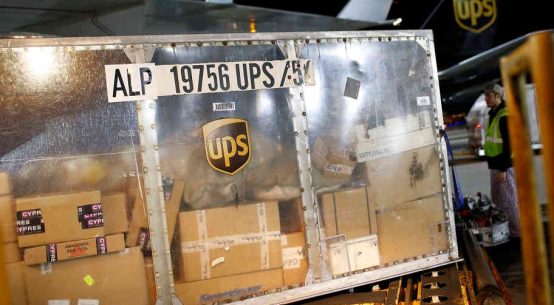
A sweeping Office of Management and Budget report proposes converting the Postal Service into a privately held corporation and spinning off air traffic control functions from the FAA.
United States’ President Donald Trump is looking to privatize the United States Postal Service despite ongoing stakeholders meetings with the White House Postal Task Force, according to a new report from the Office of Management and Budget, American Shipper reported.
Entitled “Delivering Government Solutions in the 21st Century: Reform Plan and Reorganization Recommendations,” the OMB report includes a broad range of recommendations for the “structural realignment of the Executive Branch to better serve the mission, service and stewardship needs of the American people.”
Among other things, the sweeping, 132-page report proposes combining the departments of Labor and Education and converting the USPS from a government agency into a privately held corporation, as well as changes to the Department of Transportation that include spinning off air traffic control functions from the Federal Aviation Administration.
The president has been outspoken in his criticism of the USPS, which has reported annual losses totaling more than $65 billion since the Great Recession and $2.7 billion in its last fiscal year alone.
According to the OMB report, the USPS, which operates independently of federal funding, has “extremely high fixed costs” that are no longer sufficiently supported by mail and parcel volumes.

“Despite significant decline in volume in the internet age, the size of the delivery network has continued to grow to meet expectations of the current operating structure,” the report said. “USPS can no longer support the obligations created by its enormous infrastructure and personnel requirements. USPS already has over $100 billion in unfunded liabilities, a substantial capital investment backlog has posted losses for over a decade and has no clear path to profitability without reform. A new model that adequately finances USPS while meeting the needs of rural and urban communities, large mailers and small businesses is needed.”
A big part of the problems, the report goes on to say, is that the USPS is “caught between a mandate to operate like a business but with the expenses and political oversight of a public agency.”
Citing the example of several European countries that have converted their postal carriers into private, for-profit entities, the report argues a privatized USPS “would have a substantially lower cost structure, be able to adapt to changing customer needs and make business decisions free from political interference, and have access to private capital markets to fund operational improvements without burdening taxpayers” and “would be incentivized to innovate and improve services to Americans in every community.”
Trump in April issued an executive order creating an interagency task force responsible for identifying issues that have led to the lack of profitability at USPS, as well as recommending legislative reforms in an effort to pull the agency out of its financial tailspin.
Meetings between the task force and other USPS stakeholders are currently ongoing, and the task force isn’t scheduled to make its recommendations until August, a fact that has not gone unnoticed by the National Association of Letter Carriers, which is accusing the administration of undercutting those talks with the OMB report.
“This report takes direct aim at numerous agencies including USPS under the guise of reforming and restructuring for the 21st century,” NALC President Fredric Rolando said in a statement. “The White House is making very clear that privatization of the Postal Service is its goal, despite the fact that the stakeholder meetings with the White House Postal Task Force are ongoing.”
Ronaldo said that talks would now be biased towards the findings and proposals in the OMB report and as such, the NALC would “work tirelessly with other stakeholders and Congress to oppose this faulty privatization plan every step of the way to preserve this public institution, which is based in the Constitution.”
Mark Dimondstein, president of the American Postal Workers Union, echoed those remarks, saying that the OMB report “delivered nothing but misinformation,” and conveniently omits key details of previous privatization efforts in Europe.
“European nations charge substantially more for mail services delivered in a much smaller area,” he said. “They also regularly raise the cost of delivery. For example, the cost of sending a letter in the United Kingdom has increased 80 percent over the past decade. By comparison, the U.S. has the lowest postage rates in the industrialized world.”

Dimondstein further argued that the elimination of the agency’s somewhat vaguely defined universal service obligation, the purpose of which is to ensure USPS provides a minimum level of service to all areas of the country, “would hurt business and individuals alike, and would be a dagger aimed at the heart of rural America and undermine e-commerce.”
“The public postal service serves each and every person and belongs to the people of this country,” he said. “Privatizing the Postal Service is not in the public interest or the interest of postal workers and would be nothing more than a raid by corporate pirates on a national treasure.”
The OMB report, however, is by no means the first to call for the privatization of the agency.
A 2016 report from the Cato Institute, for example, argued that “Congress should privatize the USPS, repeal its legal monopolies, and give the company the flexibility it needs to innovate and reduce costs,” adding that such reforms “would give entrepreneurs a chance to improve America’s postal services.
“Congress should wake up to changes in technology and to postal reforms around the world,” the CATO report said. “Other countries have shown that postal liberalization works, and it would work in America as well.”

Also included in the OMB report is a proposal to restructure the U.S. Department of Transportation in an effort to “better align the agency’s core missions and programmatic responsibilities, reduce transportation program fragmentation across the government, and improve outcomes.”
The most significant — and controversial — change to USDOT proposed in the report would see the FAA cede responsibility for the nation’s air traffic control system to a private, non-profit entity.
According to the report, privatizing air traffic control services “would better enable our aviation system to respond to consumer needs and modernize services.”
As with the proposal to privatize USPS, however, this is not the first time someone has suggested separating air traffic control functions from the FAA.
Federal lawmakers like Rep. Bill Shuster, R-Pa., chairman of the House T&I Committee, and Aviation Subcommittee Chairman Frank LoBiondo, R-N.J., have long argued in favor of privatization as a means of accelerating the modernization of the air traffic control system, but opponents argue that such a move represents too great a risk to those same modernization efforts.

The FAA Reauthorization Act of 2018 (H.R. 4), which flew through the House in late April but has since stalled in the Senate, for example, would fund the administration through 2023, but did not include a proposal to privatize the nation’s air traffic control operations as previous versions of the bill had.
The OMB report further asserts that privatization would allow the air traffic control system to “have better governance structures and insolation from the political system,” as well as “to better assess fees based on actual usage” of the system.
“Spinning FAA air traffic control services out of the Government, to a non-profit entity, similar to the Canadian system, has strong policy merits, evidenced by the approximately 60 countries that have shifted air traffic control responsibilities to non-governmental providers,” the report said.








